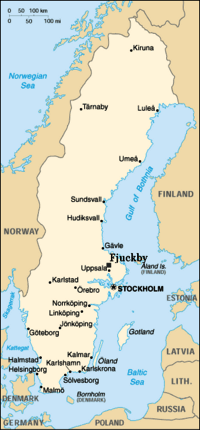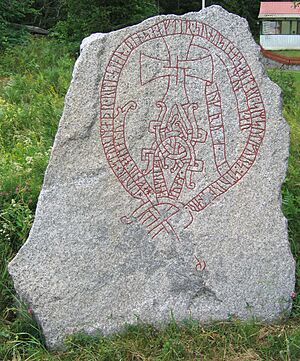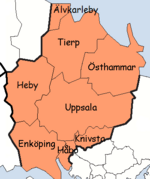Fjuckby facts for kids
Quick facts for kids
Fjuckby
|
|
|---|---|
|
Hamlet
|
|
| Country | Sweden |
| Municipality | Uppsala Municipality |
| County | Uppsala County |
| Province | Uppland |
| Area | |
| • Total | 0.18 km2 (0.07 sq mi) |
| Population | |
| • Total | 65 |
| Time zone | UTC+1 (CET) |
| • Summer (DST) | UTC+2 (CEST) |
Fjuckby is a small village in Sweden. It's located in Uppsala Municipality, which is part of Uppsala County. You can find it about 15 kilometers (9.3 miles) north of the city of Uppsala, right along European route E4.
As of 2000, only 65 people lived in Fjuckby. The village covers a small area of about 18 hectares (44.5 acres). Fjuckby is especially known for its ancient runestones. The village's unique name has also made it famous around the world!
Village History and Name
Before the 1930s, this village was known by a slightly different name: Fjukeby. But in the 1930s, the spelling was officially changed to Fjuckby.
In December 2006, some of the people living in Fjuckby wanted to change the name back to Fjukeby. They sent a request to the Swedish government office that handles names. However, the change was not allowed. This was because only 15 out of the 65 residents agreed to the name change.
Where is Fjuckby Located?
Fjuckby is found north of the city of Uppsala in central Uppsala County. Uppsala County is on Sweden's east coast. It sits between the Gulf of Bothnia in the north and Lake Mälaren in the south.
Ancient Runestones of Fjuckby
Fjuckby is home to several runestones, which are large stones with ancient carvings called runes. One of the most interesting is the Greece Runestone known as U 1016.
This runestone tells a story about someone who died at home. But it also has a hidden message! A part of the stone found more recently talks about a son who died far away in Greece.
The message on the stone says:
Captain Liut put up this stone to remember his sons. One was named Aki, who was lost overseas. <?) captained a merchant ship. He reached Greek harbors. At home he died.
A researcher named Fred Wulf believes the added message means that Captain Liut's other son, Hafnir, died at home in Sweden. This shows how important these stones are for understanding history!




